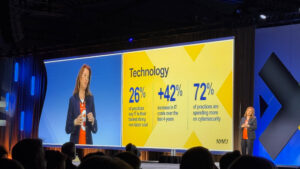Every year in the United States, 3.6 million people become Medicare eligible. Their health journey tends to go smoothly until the last few years of their lives, when their care becomes fragmented. They may need prescriptions, appointments with various doctors, mobility equipment, and more, while also wondering how much time they have left.
Statistically, caring for an aging or seriously ill loved one becomes the responsibility of the family’s oldest daughter, regardless of her caregiving or health care experience. It can be overwhelming to figure out what kind of specialist to see next, how to discuss end-of-life goals, and find community services, like transportation, translation services, behavioral health, and non-skilled care for bathing, toileting and feeding. Jeremy Powell, founder and CEO of Acclivity Health, started the company after seeing this scenario play out firsthand.
“For me, it began with palliative medicine. I was part of that 75% of the country who couldn’t define what “palliative medicine” was until a friend of mine, who was a physician and a daughter, received a late-stage terminal oncology diagnosis about her father,” said Powell. “I got to witness up close what end-of-life care should be, and I realized that the need for palliative medicine was something we could predict.”
Powell and his business partners created Acclivity Health Solutions — a connected care platform that coordinates the care of seriously ill patients across their community — to make health care simpler by using advanced analytics and Artificial Intelligences (AI) to prompt providers on when their patients should be receiving palliative or hospice services. In turn, caregivers receive the support needed and have the assurance of knowing their loves ones will receive the right care, in the right setting, at the right time. Streamlining care for these patients meant that Acclivity Health first had to address their care fragmentation.
“If every seriously ill person was in a position to tie up their emotional, spiritual, and familial lives, they would all have the same positive experience my friend had with her dad,” Powell explained. “So, what do we do about the people who are the sickest, but their records are splintered, so no one can see their journey in its totality? While 80% of us want to die at home, 65% of us die in the hospital because humans don’t do well making predictions about the end of life. This means we’re unable to plan for it to happen according to our wishes and goals.”
Acclivity’s platform uses real-time patient data from multiple sources to better predict when a patient may need palliative or hospice care, and prognosticate more accurately so end-of-life conversations can happen before it’s too late.
“We’ve known for a while we could use technology to predict things humans aren’t historically good at predicting. For example, if you ask a clinician the likelihood of a person passing in the next 12 months, they would predict that accurately about 12% of the time. Our platform gets it right about 90% of the time,” said Powell. “One of our differentiators is that our prognosis tooling takes into account frailty indicators, ambulatory status, emotional, social and spiritual factors, and other aspects that are hard for humans to recognize and quantify.”
The Connected Community Interoperability Framework is the first nationwide network of health care providers, health plans, EHRs, financial and technology resources to coordinate and improve clinical outcomes for patients with advanced illness. By empowering health care providers to securely and easily connect and collaborate with multiple disciplines within a patient’s care team via one integrated framework, they’re able to provide appropriate and timely services that help to improve clinical and financial outcomes.
While Acclivity Health has expanded considerably, from developing a mobile application to helping more than 100 hospice organizations and primary care practices prepare for success in the CMS Primary Care First program, the heart of the company will always remain the same: ensuring patients receive the appropriate care, when they need it, in alignment with their values, beliefs, and goals.
“I’ve been asked before, what is one thing I would bring to health care to change it for the better? It would be for organizations to come onto this framework that has the ability to answer any question that a daughter watching her mom go through the last few chapters of life may have, whether those are psychosocial, spiritual, medical, about community services, copays, or her own grief,” said Powell. “I hope Acclivity Health continues to provide flexible and scalable solutions to all organizations in need of these services and that the reimbursement shifts continue to promote attention to these patients. We have now connected communities across 38 states with 4 million patients on our platform, and we serve them every day like it’s the most important thing we do, because every day we get up knowing we’re going to impact lives.”
If you would like to learn more about how Acclivity Health can help you better managed care for your patients, email us at info@AcclivityHealth.com.



